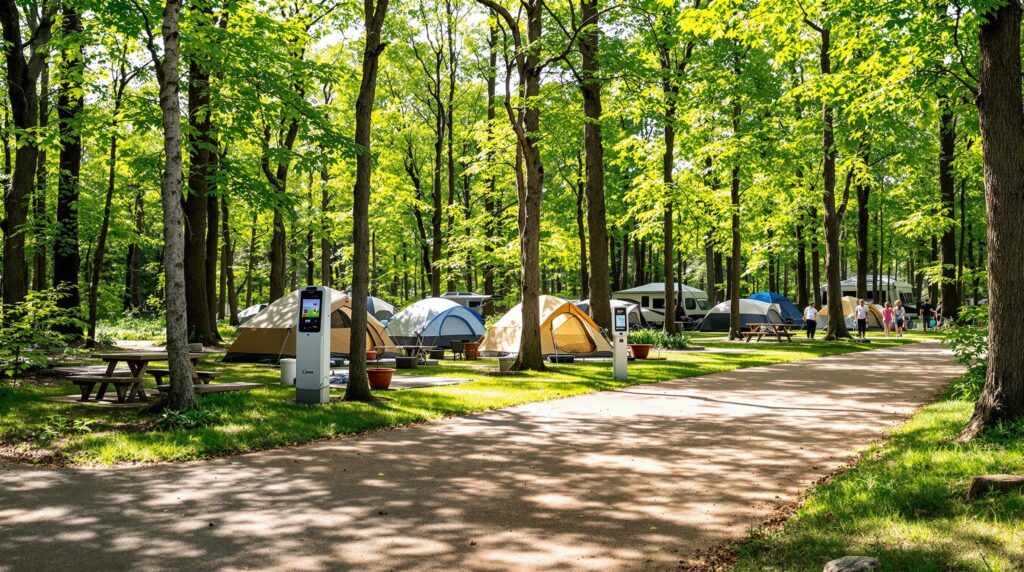Connecticut’s Department of Energy and Environmental Protection will open several state park and forest campgrounds for the spring season on April 11, offering early access to outdoor recreation before summer crowds arrive. The plan provides an option for visitors eager to experience the outdoors as temperatures rise, though specific campsite details remain subject to the department’s ongoing announcements.
A recent announcement from the department official protocols explains that out-of-state visitors will need to pay for parking remotely through Reserve America from April 1 to October 31. This requirement ensures that those without a Connecticut-registered vehicle contribute to the Passport to Parks program, which waives entry fees for residents.
Prior to Memorial Day weekend, there will be no staffed ticket booths at state park entrances. As a result, non-resident drivers are asked to submit fees online upon arrival. According to a press release from the Connecticut Department of Energy and Environmental Protection, both facilities and staffing typically ramp up by Memorial Day to accommodate the seasonal influx of travelers.
“Spring is a beautiful time of year in Connecticut’s State Parks and Forests, and we are working hard to ensure that facilities are staffed and ready to welcome the influx of visitors we expect to see during the next several months,” said DEEP Commissioner Katie Dykes in that press release. She added, “Thanks to Passport to the Parks, Connecticut’s incredible State Parks and Forests are free to enter for those driving a Connecticut-registered vehicle. We charge out-of-state parking fees to ensure non-residents also contribute to Passport to the Parks. This consistent, predictable funding source allows us to ensure our parks are staffed and ready to welcome millions of visitors each season.”
Campgrounds that begin operating in April note that facilities may vary seasonally, with running water typically unavailable and restroom services provided by portable structures until Memorial Day. DEEP advises that travelers check official resources for the latest information on campsite availability and rules, given that operating procedures can differ across various locations.
The department manages numerous state parks that draw significant visitation and bolster employment. These parks contribute to local economies and promote outdoor recreation during the spring, summer, and fall months. As demand grows, upgrades to digital payment systems and ongoing maintenance help ensure a smooth transition between shoulder seasons and the peak summer period.
Many campground operators nationwide employ practices that reduce environmental impact and operational costs, including solar-powered lighting, energy-efficient water systems, and comprehensive recycling stations. Such measures resonate with visitors who prefer eco-conscious travel, and they align with the broader objective of safeguarding natural spaces for future generations.
An independent study from the RV Industry Association found that a substantial share of surveyed campgrounds across the country have adopted solar or energy-efficient features, significantly lowering overhead costs and reducing pollution. By integrating these systems, businesses can streamline expenses while appealing to travelers who value ecological responsibility.
By integrating native plants into landscaping, these facilities help conserve water and nurture local habitats. This approach supports pollinators and ensures the grounds remain visually appealing. Informational signage helps visitors understand how to participate in sustainable practices that protect Connecticut’s ecosystems.
These stewardship strategies fit well with ongoing efforts to modernize services. Alongside environmental solutions, many sites are looking to streamline check-ins, contactless payment, and direct updates on closures or advisories. A growing comfort with automated hospitality features is reflected by nearly 80% of travelers who are open to self-service technologies fresh data.
Separate research points to similar acceptance in apartment-style accommodations further insights, revealing a broader trend toward contactless experiences in lodging. These approaches can reduce lines during busy weekends and let staff focus on more hands-on tasks where they are most needed.
Prospective campers are encouraged to review DEEP’s official site for the most current information and to plan their trips accordingly. Embracing sustainable initiatives and enhanced digital options may enrich spring stays for Connecticut’s guests, cultivating a balance between visitor enjoyment and the long-term preservation of natural resources.








